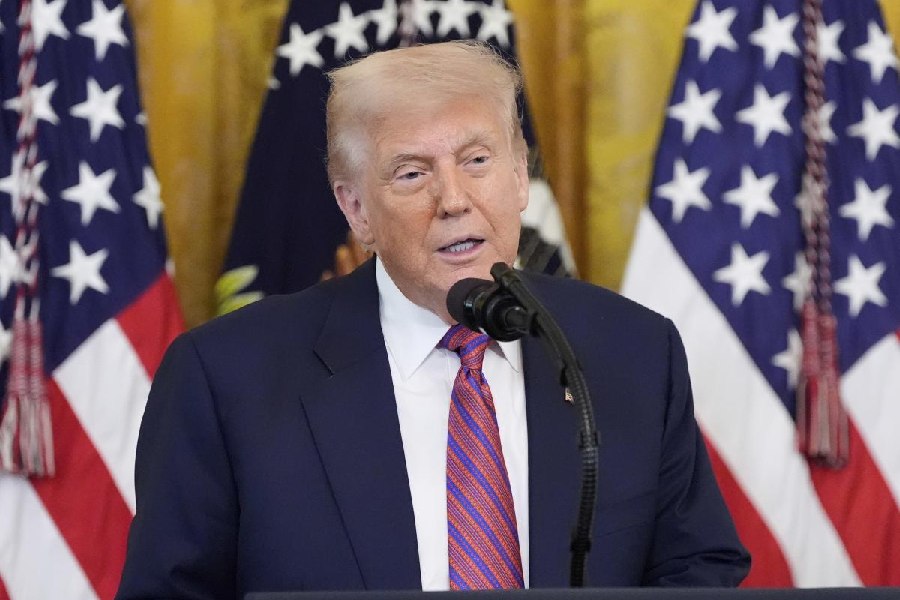The threats never stop. Even as the United States of America and India negotiate a trade deal, President Donald Trump has taken aim at BRICS members as well as nations that purchase oil from Russia. Calling BRICS “anti-American”, Trump has warned that he could impose an additional 10% tariff — on top of country-specific levies — on all nations associated with the bloc. He has also threatened to impose extra 100% tariffs on all countries that buy energy from Moscow in a bid to pressure the Russian president, Vladimir Putin, to agree to a ceasefire in Ukraine. Influential members of the US Congress, including the Republican, Lindsay Graham, and the Democrat, Richard Blumenthal, are pushing for those tariffs to go as high as 500%. Mark Rutte, chief of NATO, has further inflamed matters by suggesting that countries trading with Russia relook at their policies in the face of the tariff warning.
These provocations might appear to be targeted — Trump claims that BRICS is preparing a counter-currency to the US dollar, even though the group denies any such plan and if countries were to stop buying Russian oil and gas, that would indeed impose major economic pressure on Putin, who relies on energy revenue to keep his country’s economy afloat. But look deeper, and a pattern emerges. These threats are fundamentally aimed at destroying the post-Berlin Wall system of open trade and at forcing the world back into a new Cold War.
India needs to recalibrate its geopolitical approach to accept this reality, because it sits astride the fault lines that could shape the global future. It is both a founding member of BRICS and, along with China, one of the biggest consumers of Russian oil. It has been both a leading voice of the Global South and has, in recent years, increasingly viewed its relationship with the US as its most vital partnership. For more than a quarter of a century, India — across multiple governments and parties — juggled these seemingly complex ties with dexterity. While that is a tribute to India’s fine diplomatic corps, the breakdown of old fears and suspicions helped.
The US might not have ever liked the idea of BRICS, and it actively tried to stop countries from buying Russian crude after the 2022 invasion of Ukraine. But Washington valued its own vast and growing trade and security partnership with countries like India, Brazil and South Africa enough to not force these countries to pick sides. It understood that deep-rooted traditions of strategic autonomy meant that pressure beyond a point could turn these countries against the US. Instead, it tried to win them over as future allies through a mix of allurements and patience.
That approach has collapsed. The former US president. George W. Bush, infamously declared after the September 11 attacks that “either you are with us, or you are with the terrorists”. Trump is extending that dictum to the entire spectrum of world affairs. If he does not like a country’s policies towards the US, that nation could face tariffs. If his conspiratorial mind imagined a plot to dethrone the US dollar, a bloc of important trading partners could face penalties. If a country or group stands up to his bullying, like Canada and the European Union have tried to, it could be targeted with destructive duties. If his allies in a foreign country are facing the force of law, he might hit them with tariffs too.
It is that last scenario that should most worry all of America’s partners, including India. Trump’s explanation for 50% tariffs on Brazil includes his demand that the case against the former Brazilian president, Jair Bolsonaro — whose supporters attempted an insurrection after he lost just as Trump’s supporters once did — be dropped. Bolsonaro subscribes to a Trump-like, nationalist, far-Right politics that scapegoats minorities. That Trump is willing to use ideological reasons to impose tariffs on a country with which it has a trade surplus only underscores parallels with the Cold War.
If the US goes down this path, it will be the loser. The world has no appetite for another Cold War. But a ‘with us or against us’ policy in the US will hurt India too. It is time to prepare for that.
Charu Sudan Kasturi is a journalist who writes on foreign policy and international relations










